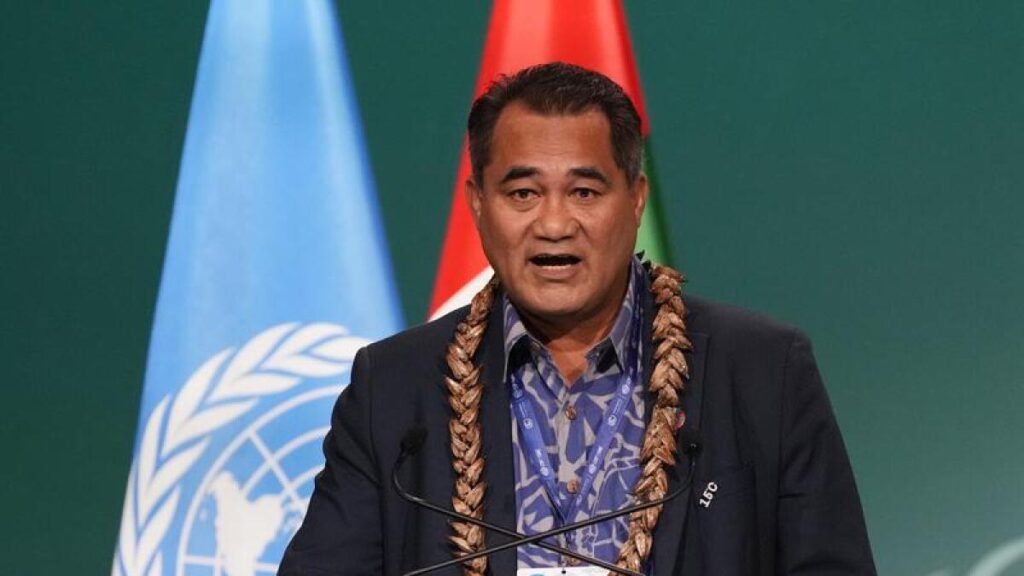A group of countries including Australia, the US, the UK, Canada and Japan have said they will “not be a co-signatory” to “death certificates” for small island states, and have demanded a stronger agreement at the Cop28 summit to deal with fossil fuels and address the climate crisis.
A statement delivered by the Australian climate change minister, Chris Bowen, on behalf of what’s known as the umbrella group of countries, came as tensions flared at the United Arab Emirates over the text of a draft deal proposed by the summit presidency.
Released early on Monday evening local time, the draft avoided highly contentious calls for a “phase-out” or “phase-down” of fossil fuels in an attempt to find consensus from nearly 200 countries that have been meeting in Dubai for nearly a fortnight.
Released early on Monday evening local time, the draft avoided highly contentious calls for a “phase-out” or “phase-down” of fossil fuels in an attempt to find consensus from nearly 200 countries that have been meeting in Dubai for nearly a fortnight.Some observers welcomed elements of the draft, including the first mention in a Cop text of reducing fossil fuel production, but others were scathing, describing it as “grossly insufficient” and “incoherent”.
Cedric Schuster of Samoa, the chair of the Alliance of Small Island States, said: “We will not sign our death certificate. We cannot sign on to text that does not have strong commitments on phasing out fossil fuels.”
Bowen referred to Schuster’s statement in his intervention in a later meeting between government representatives and the UAE summit president, Sultan Al Jaber. He was speaking on behalf of the umbrella group of countries, which also includes New Zealand, Norway, Israel, Ukraine and Kazakhstan.
“My friend Cedric Schuster, the Samoan minister, said tonight of this draft that we will not sign our death certificates,” Bowen said. “That’s what’s at stake for many countries who are represented here tonight and many people who do not have a voice. We will not be a co-signatory to those death certificates.”
Bowen said there were some positive elements in the draft, but the group was united in believing it was too weak. It needed to send a much clearer signal on the future of fossil fuels, better address climate adaptation and deliver “an outcome which we can be proud of and explain to people is not a step forward, but a step change”, he said.
He said the group, which includes several of the world’s biggest fossil fuel users and producers, believed in a phase-out of “unabated” fossil fuels – a controversial position that suggests coal, oil and gas could still be used if carbon capture and storage technology proved viable. But he said it could support different wording in the deal, suggesting “a transition away from fossil fuels in keeping with the science”.
He said it could not be flexible on having an agreement that kept the goal of limiting global heating to 1.5C within reach. “That’s not up for compromise,” Bowen said.
The umbrella group joined a list of countries, civil society groups and analysts objecting to the text. The meeting was due to finish late Tuesday morning, but there was no compromise in sight as that deadline approached.
Instead of requiring producers to cut their fossil fuel output, the draft framed such reductions as optional by calling on countries to “take actions that could include” reducing fossil fuels. Some country groups, including the EU, indicated it could lead them to walk out of the talks if not addressed.
While many countries wanted the text strengthened, climate campaigners feared that others such as Saudi Arabia and its oil producing allies in Opec might use the final hours to try to further weaken the draft. The Saudis have spent the meeting insisting the document should refer to dealing with emissions, not fossil fuels.
The text includes a reference to scientific advice that many countries are likely to interpret as a reference to the Intergovernmental Panel on Climate Change, which concluded fossil fuels could only have a small role in 2050 if the world was to reach net zero emissions and limit average global heating to 1.5C above pre-industrial levels.
The like minded group of developing countries, which includes China, India and Saudi Arabia, have accused umbrella group members US, Norway, Australia and Canada of hypocrisy for saying they wanted to phase out unabated fossil fuels while planning to either expand or not significantly cut their own production.
Wealthy countries have also been criticised for failing to deliver on the billions needed in climate finance for vulnerable nations.
The chief executive of Climate Analytics, Dr Bill Hare, said the text was an “epic mess” and there was “no way if it was operationalised that it would keep 1.5C in reach”. He said it did not adequately reference phasing out fossil fuels or the need to act rapidly this decade to address the problem.
“I would say it’s giving every fossil fuel exporter on the planet everything they need to expand fossil fuel production,” Hare said.
A spokesperson for Al Jaber, who has described keeping 1.5C within reach as his “north star”, earlier said: “The Cop28 presidency has been clear from the beginning about our ambitions. This text reflects those ambitions and is a huge step forward. Now it is in the hands of the parties, who we trust to do what is best for humanity and the planet.”
Source : The Guardian


